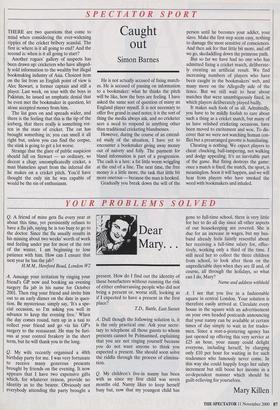SPECTATOR SPORT
Caught out
Simon Barnes
THERE are two questions that come to mind when considering the ever-widening ripples of the cricket bribery scandal. The first is: where is it all going to end? And the second is: when is it all going to start?
Another rogues' gallery of suspects has been drawn up: cricketers who have alleged- ly sold information to the wealthy but illegal bookmaking industry of Asia. Choicest item on the list from an English point of view is Alec Stewart, a former captain and still a player. Last week, on tour with the boys in Pakistan, he issued an emphatic denial that he even met the bookmaker in question, let alone accepted money from him.
The list goes on and spreads wider, and there is the feeling that this is the tip of the iceberg, that there really is something rot- ten in the state of cricket. The cat has brought something in; you can smell it all right but, unless you can find the corpse, the stink is going to get a lot worse.
Strange that the glare of public suspicion should fall on Stewart — so ordinary, so decent a chap; uneomplicatedly cricket, a man blameless apart from the infernal din he makes on a cricket pitch. You'd have thought the only sin he was capable of would be the sin of enthusiasm. He is not actually accused of fixing match- es. He is accused of passing on information to a bookmaker: what he thinks the pitch will be like, how the boys are feeling. I have asked the same sort of question of many an England player myself. It is not necessary to offer five grand in used notes; it is the sort of thing the media always ask, and no cricketer sees a. need to respond in anything other than traditional cricketing blandnesses.
However, during the course of an extend- ed study of the situation, I have yet to encounter a bookmaker giving away money out of naivety and folly. The payment for bland information is part of a progression. The cash is a lure: a fat little worm wriggling at the end of a line. The next time, the free money is a little more, the task that little bit more onerous — because the man is hooked.
Gradually you break down the will of the person until he becomes your addict, your slave. Make the first step seem easy, nothing to damage the most sensitive of consciences. And then ask for that little bit more, and off we go, skedaddling down the primrose path.
But so far we have had no one who has admitted fixing a cricket match, deliberate- ly creating an artificial result. We find increasing numbers of players who have been caught in the bookmakers' web, and many more on the Allegedly side of the fence. But we still wait to hear about matches that were unambiguously fixed, in which players deliberately played badly.
It makes such fools of us all. Admittedly, you have to be mildly foolish to care about such a thing as a cricket match, but many of us have relished cricketing occasions, have been moved to excitement and woe. To dis- cover that we were not watching human con- flict but a prearranged gavotte is humiliating.
Cheating is nothing. We expect players to cheat: chucking, ball-tampering, not walking and dodgy appealing. It's an inevitable part of the game. But fixing destroys the game: once a match is fixed, the match, the sport, is meaningless. Soon it will happen, and we will hear from players who have smoked the weed with bookmakers and inhaled.


























































































 Previous page
Previous page